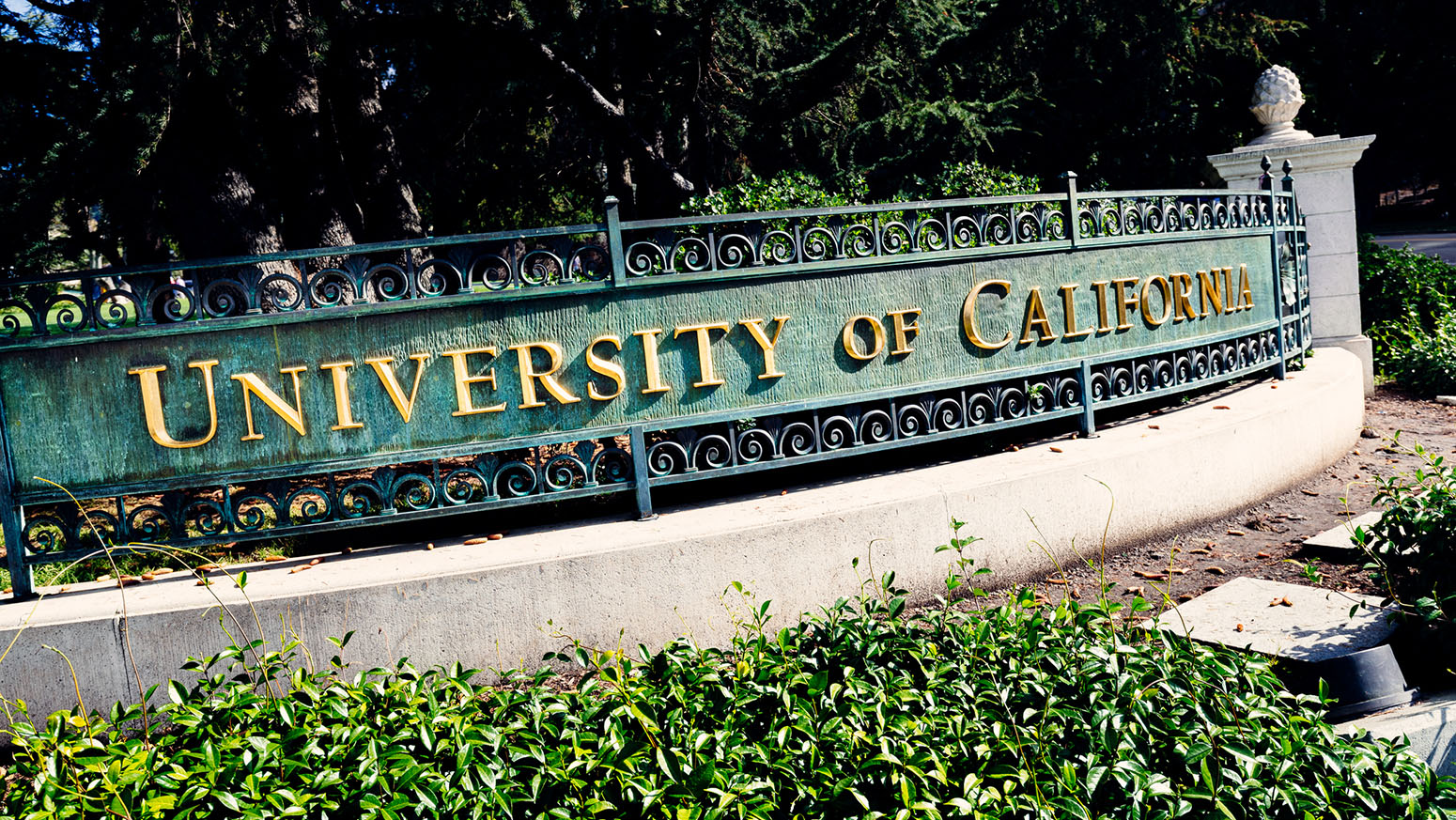Editor’s note: ImpactAlpha contributing editor Imogen Rose-Smith, a longtime senior writer for Institutional Investor, contributes a bi-weekly column on the policies, practices and strategies of the largest asset allocators, including pensions, foundations, and endowments. As Imogen says, she’s “tracking what investors do, not just what they say.”
ImpactAlpha, Feb. 22 – Jagdeep Singh Bachher has a tiger by the tail.
The notoriously smooth-talking chief investment officer for the Regents of the University of California is facing down protests from organized labor and other stakeholders, including concerned UC faculty members and students.
At issue: a $4.5 billion investment that the $157 billion UC investment office made in a real estate fund operated by Blackstone, the $975 billion investment firm based in New York and headed by Stephen Schwarzman.
Having worked under Bachher as an investment fellow at the UC Regents’ investment office in Oakland, Calif. for a little more than two years, the spectacle of the squirming CIO is more than slightly satisfying (for pure theater, I recommend the investment committee meetings of the UC Regents, which are live-streamed and available on video replay; they give me flashbacks). Bachher is attempting to thread the needle between the lofty values his office claims to adhere to, the desire to cut a sweet (for whom?) deal with one of the largest and most powerful investment firms in the world, and the university’s angry and politically influential unions.
I acknowledge that my views on Bachher’s leadership may be biased (I prefer “informed”) by my experiences. Yet the challenges that he, the Regents, and his real estate investment team are currently facing speak to a broader, deeper, problem in institutional asset management.
Institutional investment dollars have grown massively over the past two decades at the same time, the asymmetry between the haves and the have nots in the U.S. and elsewhere has expanded and accelerated. Exhibit A: the shortage of affordable housing and rising share of most workers income consumed by housing costs.
Those institutional investors (who are among the haves) are investing in things, not only in housing, that drive up the cost of goods and services (see my 2021 column, “Some of pension funds’ spectacular returns are coming at the expense of their own beneficiaries”). Some of those things also lower the standard of living for the have-nots. In recent years, social and economic tensions, income stagnation, inflation and now rising interest rates have exacerbated the tensions.
A corollary issue is that private equity firms like Blackstone, and their senior leadership of almost entirely older white men, have made giant globs of money. Much of it comes out of fees collected from public pension plans. The same public pension plans whose beneficiaries – union members – increasingly are being priced out of their local housing market because of rising costs. Costs that are rising in part because institutional investors, including Blackstone, have since the 2008 mortgage crisis bought up thousands of units of affordable housing.
Just because a firm like Blackstone is making a social investment does not make that socially good. Private equity firms have been investing in areas from housing to healthcare, and even prison services, providing goods and services to low-income communities. At the end of the day the communities that these large private equity and real estate firms are investing in are the source of revenue, and returns, for the managers and their investors. When, particularly in a rising interest rate environment, those deals struggle, it is the consumer that gets squeezed.
Call it the poverty trade. And public pension plans – including the UC Regents – are among the investors looking to profit. The issue here is that, without the right guardrails, such investments can become extractive – and exploitative.
In order to achieve the types of double-digit returns, after fees, that an investor like UC wants, a manager can either reduce costs or raise revenues. The community, in the form of renters, is the source of those revenues. There are only so many ways to get juice out of a lemon.
Blackstone might be fixing a few windows. But their ultimate goal is to deliver a return to investors by making their investment as profitable as possible. The system breaks down when that profit comes at the cost of, not in benefit to, the communities to whom the university should be accountable.
In this poverty trade, large private equity and real estate firms are figuring out how to leverage federal spending programs for their own financial gain. They reap large fees for investing public money while taking advantage of federal government spending programs to generate guaranteed income. The investment firms, including Blackstone, then spend money lobbying for government benefits. All the while, wealthy financiers like Schwarzman make large political donations to the GOP, among other things, to try to keep their taxes low.
It’s not a pretty spectacle. But outside of the public comments, you wouldn’t get that picture from watching a UC Regents investor committee meeting.
Crown jewel
Blackstone launched Blackstone Real Estate Income Trust (or BREIT) in 2017 as a privately held real estate trust aimed at non-institutional investors. The Financial Times’ Alphaville in October 2022 described the fund as Blackstone’s “‘beloved’ $126 billion crown jewel.” The strategy was central to Blackstone’s growth plans. CEO Schwarzman publicly sang its praises, and both he and President Jonathon Gray, formerly head of real estate, invested in the fund. BREIT accounted for one-fifth of Blackstone’s annual fee revenue in 2021 according to Goldman Sachs.
In November, Bloomberg reported that BREIT had hit upon a strategy to squeeze enough cash to offset inflation, which Blackstone executives had predicted would be stubborn. “BREIT parked some 20% of its money into warehouses and logistics centers, in a bet that e-commerce would buoy rents,” the article explained. “Even more money went to residential property, which now accounts for about half of its portfolio. Executives have a thesis that a housing shortage would give property owners leverage to constantly reset rents.”
Back in 2021 BREIT had acquired the affordable housing business Home Partners of America. Bloomberg called it “a platform through which Blackstone could say it was giving renters a chance to become homeowners.” Last year, BREIT put down roughly $5.1 billion more to purchase affordable housing assets from American International Group Inc.
The successful launch of BREIT caused rivals to launch similar firms. The once-sleepy and nontraded REIT market became in 2020 and 2021, in the words of one financial research report, “as action-packed as Pete Davidson’s love life.” BREIT was growing like gangbusters, making a profit for its investors and Blackstone.
By late last year, however, the U.S. real estate market, and the economy more broadly, were looking far more dicey. Bloomberg, the FT and others questioned how BREIT would fare in a new economic environment. By raising rates to try and curb inflation, the Fed caused mortgage rates to rise and real estate prices to fall.
BREIT stumbled. As investors sought to withdraw cash last fall, Blackstone began gating redemptions from BREIT, which had a net asset value of $69 billion as of November of 2022. The gating has continued into the new year. The firm says it is working through November, December, and January redemptions. “We think over time, we’ll be able to work down this backlog,” Gray told analysts.
Enter Bachher. Blackstone needed cash to satisfy the incoming redemption requests without having to conduct a firesale. The UC has cash. Lots of it.
At the January UC Regents investment committee meeting, the CIO said he learned on December 8 that BREIT was in trouble and reached out.” He says he thought the liquidity problem was more perceived than real.
“I kind of get the fact that liquidity is important,” he told Blackstone. “If we can be helpful we’re here.”
The conversation culminated in the January 3 announcement. Under the deal, the UC Regents put $4 billion into BREIT, buying $4 billion of Class A shares in the REIT under the same terms and fees as the existing investors.
Sweetening the deal, Blackstone agreed to put up $1 billion to backstop the UC’s investment. The funds went “to support an 11.25% minimum annualized net return for UC Investments over the effective 6-year hold period.” In return, Blackstone is entitled an incremental 5% cash promote payment on any returns received in excess of the 11.25% minimum. As Bachher was quick to point out, a guaranteed six-year return of 11.25% is attractive. But the fine print also makes clear that Blackstone will continue to make a significant profit so long as the fund returns stay above 8.7%.
The deal was widely viewed in the market as a vote of confidence in Blackstone and BREIT. Whether it is a great deal for the UC – the investment office is getting a guaranteed return of 11.25%, but paying for the privilege – is less clear (see this Substack column that breaks down why the investment might not be such a great trade for the Regents.)
From his presentation to the Regents, it is obvious Bachher is immensely proud of the transaction that he and his team put together, led by UC Investments’ co-heads of real estate, Satish Swamy and Arthur Guimarães.
Sky-high rents
Not everyone else was so enamored by what Bachher, Swamy, and Guimarães cooked up.
In mid-January, unions representing 110,000 University of California workers wrote a letter to Bachher demanding that the UC divest from Blackstone, including the $4 billion BREIT commitment. The unions were objecting to the impact that Blackstone’s entrance to the real estate market has had on housing prices.
“The University of California’s current housing investment strategy, combined with the bolstering of Blackstone’s BREIT, will only further deepen a hostile housing market for millions across California,” union leaders wrote to Bachher. In 2022, thousands of university graduate students and workers went on strike demanding pay increases to meet the high cost of living in California. Housing costs are a massive concern to, and headache for, the university.
“UC investments are funded by its workers, pensioners, students and alumni—each of whom are struggling with the crushing burdens of California’s housing affordability crisis,” AFSCME 3299 President Kathryn Lybarger said in a statement. Lybarger is an advisor to the UC Regents’ Investment Committee, and has made similar comments during meetings.
“To then push those hard-earned dollars into investments designed to push housing prices even higher is beyond negligent,” she said. “It is a betrayal of this institution’s core obligations to its workers, students and the communities in which it operates.”
The unions showed up in force at the January 17 meeting of the Board of Regents investment committee.
Bachher likes to keep these meetings to a tight, one-hour discussion. The January 17 event went on for almost three hours, with the first 40 minutes or so devoted to public comment, many from union members for whom Blackstone was a landlord. The thrust of their complaints was that, under Blackstone, rents had gone up, with some facing eviction, and quality of service had gone down.
There are two separate but related issues here. One is the allegations that Blackstone is a bad landlord (which the company denies.)
The second and more problematic is that Blackstone and other private equity firms have contributed to rising housing costs by participating in the market. Blackstone, for example, has actively lobbied against ballot propositions designed to preserve and/or extend rent control in the state of California.
In its own words
Bachher showed his true colors when asked by the chair of the Board of Regents, Richard Leib (also an ex officio member of the investment committee), how the investment office might play the role of activist and push back against some of Blackstone’s reported behaviors and activities.
Bachher was quick to point out that the UC’s total exposure to the San Diego property that was the specific source of the unions’ protests is only $3 million. Rather than accept that the investment office might want to do something to push back against its good partner Blackstone, the CIO turned the meeting over to….Blackstone.
Bachher had invited two of the firm’s representatives, Nadeem Meghjithe, U.S. head of real estate, and Kathleen McCarthy, the global co-head of real estate. As Baccher told the Regents, “I just thought why should I speak to make a suggestion to Blackstone when they are right here. Let them respond directly to exactly the questions you’ve asked.”
In a well-choreographed play, McCarthy led a discussion designed to show how deeply the asset management firm cares about the communities it invests in. That includes developing and operating campus housing and affordable housing, she said. McCarthy described Blackstone’s “resident-centric approach,” focused “on high-quality communities. Making sure we are investing in them so they are good quality places to live. Ensuring we have proper staffing at those properties to engage with our residents.” When people are going through hard times, “We are there to support them.”
COVID, she said, served as the “ultimate example of our approach.” Blackstone “did not evict a single person for non-payment for two years,” she said (one Regent pointed out that in California, at least, it was illegal during that time to evict tenants for non-payment of rent).
McCarthy also made the case that the UC and Blackstone can work together to build more affordable housing, in her mind the greatest driver of the housing crisis. If the likes of Blackstone hadn’t been buying up so many homes over the last decade, this would be less of a problem.
Bachher also invited an economist, Kenneth Rosen, chair of UC Berkeley’s Fisher Center for Real Estate and Urban Economics, who spoke to the academic research that shows rent control discourages investment in new housing. Rosen heaped praise on the work that Blackstone has done, adding that he himself has been involved in creating a rent-to-own company (with Lou Ranieri, “the father of mortgage-backed securities”) that Blackstone now owns.
As someone who has lived in New York City for more than 20 years, I know there are problems with rent control. And I’m not here to say that Blackstone might not have good intentions, or that everything it does is bad.
But it’s inescapable that the revenue-generating assets here are the tenants, including the federal dollars that they bring in. The trade is able to generate a guaranteed 11.25% for the UC Regents during a time when California residents’ cost of living is rising. As BREIT makes clear, it sees rental income as a hedge against inflation.
$1.1 billion pay day
The problem that Bachher and Blackstone have is that they are not a charity. They are fiduciaries, in the business of making money. The elephant in the room is wealth – who in our society has it, and who does not.
Under the standards set by the U.S. Department of Housing and Urban Development to qualify for subsidies under Section Eight, a person must be making either an “extremely low” or “very low” income. In Los Angeles, “extremely low” for a family of four in May 2022 meant 30% of the local median wage, or $35,750 a year. “Very low” is 50%, or $59,550. Last November, the most HUD could pay to help a family with a Section 8 housing voucher for a two-bedroom apartment in Los Angeles was $2,666 a month.
Good luck finding a two-bedroom apartment in L.A. for $2,666 a month.
Schwarzman, meanwhile, took home $1.1 billion in dividends and compensation in 2021, according to Bloomberg, “in what amounts to one of Wall Street’s biggest annual payouts on record.”
Gray, described by Bloomberg as “Schwarzman’s heir apparent,” earned $156.6 million in 2021 from compensation, as well as an additional $167.2 million from dividends tied to his 3% stake in the firm (Blackstone has not yet released its 2022 compensation figures).
Bloomberg estimates Schwarzman’s total net worth at $32 billion, making him the 41st richest person in the world, according to the Bloomberg Billionaires Index (one notch above hedge fund manager Ken Griffin). Bloomberg estimates Gray’s net worth to be $4.46 billion, netting him only 481st on the richest-person list.
Even a decade ago, according to The Deal, Gray owned a co-op on Park Avenue that he bought in 2005 for $7.6 million, and a home in Sagaponack that was purchased for $2.88 million in 2003.
Schwarzman is reported to own homes in New York, Palm Beach, Saint Tropez, and Jamaica. Last year the CEO purchased a 2,000-acre estate in the English countryside for $89.2 million. L.A.’s left-leaning publication City Watch ran with the headline, “Stephen Schwarzman, Killer of California Rent Control Measures, Buys $89.2 Million Mansion.”
As a former hedge fund reporter, I have no problem with people being rich. I’m not too bothered by the idea of people profiting off asset management, or from managing pension money. And I believe in the diversification benefits of alternative investments.
I don’t begrudge Schwarzman his houses, or his parties, or even his political donations (well, maybe those). Or Gray his success. I like houses. I own a home. I just bought a new one. It’s nice.
But it’s hard to escape the feeling that something has gone horribly wrong when giant sums of money are made by the asset management billionaires at the top of the heap, while the union members of the pension plans they are managing, and profiting from, can’t afford homes.
Here’s a thought: What if we just stopped giving money to Schwarzman? It seems he has enough of it. Stop giving Blackstone all the checks. Give someone else a chance.
That’s not the way asset management works.
Systemic risk
Past performance is no indication of future returns and all of that. But the asset management industry is a backward-looking model that functions on track record and prior results. Middle men (and women) like Bachher are incentivized to keep investing money in large asset managers like Blackstone because they are a proven safe pair of hands. They are capable of absorbing the large checks that a $157 billion investment office needs to write.
This approach worked great when the alternative investment industry was nascent, and asset managers and asset owners both were smaller. Now, the lucrative fee model means that large alternative investment managers like Blackstone become a virtual cash printing machine for their owners and senior leadership.
The argument in favor of funds like UC Regents continuing to invest with the Blackstones of this world is that pension plans and other institutional allocators have a fiduciary duty to seek out the best and highest-performing fund managers. No other factors, certainly not how many houses Schwarzman has, or even the company’s track record regarding low-income homeowners and renters, should come into consideration.
Acting as a fiduciary, my duty has historically (or at least recently) been considered to be only to the bottom line. I can not take into account all the what ifs and variables that my decision making might have. Should I not invest in egg futures because that might drive up prices? It is hard, if not impossible, for any CIO to game out the consequences of what impact any given investment might have on beneficiaries. Their job is to manage the money. There is no need to second-guess their actions.
That was the opinion expressed robustly at the Regents’ January investment committee meeting. Regent Hadi Makarechian, in particular, came to the defense of his CIO, dialing in to the meeting from his home Los Angeles with a burnt-orange complexion that rivaled that of a certain other real estate mogul.
But is this really true?
If pension officials are making investment decisions that negatively impact their beneficiaries by, say, driving up the cost of housing, should that impact have some bearing on their decision-making?
I do think there is a fiduciary case that such impacts are material when the decision to make certain investments can have a destabilizing effect on the overall economy, and thereby serve to depress my overall returns as well (see, for example, “Chasing alpha is fine, but long-term returns for universal owners require beta stewardship”).
It seems reasonable to insist that pension plans in particular not make investments that actively undermine the livelihood of the beneficiaries whose assets they manage. If your pension is secure but you can’t afford a place to live because Blackstone et al have bought up all the housing stock, are your best financial interests being served?
As your Institutional Impact columnist likes to note, the ratings agency Moody’s has indicated that the U.S. could be at risk of a debt downgrade as a result of mounting income inequality and concerns around social and racial injustice. To the extent that a pension plan, or other fiduciary, makes investments that exacerbate those inequalities, they increase systemic risk. Wasn’t that at least one of the lessons of the subprime mortgage crisis?
And Blackstone recognizes there are ESG risks associated with its business. In its most recent annual report filed with the SEC, the firm cites as a risk factor the fact that it is “subject to increasing scrutiny from regulators and certain investors with respect to the environmental, social and governance impact of investments made by our funds, which may adversely impact our ability to raise capital from certain investors and constrain capital deployment opportunities for our funds.”
Blackstone acknowledges that “investors, including public pension funds, which represent a significant portion of our funds’ investor bases [emphasis mine]” may withdraw capital or not commit it in the first place, “as a result of their assessment of our approach to and consideration of the social cost of investments made by our funds or their assessment that our funds are insufficiently ambitious in allocating capital in ways that align with such investors’ ESG priorities.”
That is, the UC Regents may be keen to put aside objections to Blackstone’s actions. The company itself, in its regulatory filings, acknowledges there are risks associated with the “social costs” of their investments.
UC and ESG
This brouhaha is not Bachher’s first ESG rodeo.
When he joined the investment office in 2015, the UC Regents were in the midst of a discussion around fossil fuel divestment. Later, the office was called upon to divest from for-profit prisons. More recently, the Office of the Chief Investment officer has been under scrutiny for its actions concerning diversity.
Each time, Bachher has shown himself adept at tap dancing and making splashy announcements. Baccher has won kudos for his willingness to engage on ESG matters – and, to be fair, the UC is doing much more today than it was 10 years ago – while never really digging into the substance of the issues at hand. The UC may have divested from for-profit prison REITS, for example. But the system still has private equity holdings in companies that profit from mass incarceration.
Diversity, equity, and inclusion is another case in point. A significant portion of the January investor committee meeting was given over to diversity efforts. In a presentation given by Guimarães (part of that real estate dream team that underwrote BREIT) the investment office laid out how its $21.4 billion in allocations over five years to firms (or teams) that are at least 25% owned by women or underrepresented minorities.
Hold on. That is $21.4 billion out of a total of $157 billion. It’s been more than a half-decade since the state legislature mandated that the investment office take action regarding diversity, equity and inclusion in its investment portfolio. In 2021-22, the UC increased the assets managed by diverse-owned partners by all of $2.6 billion.
Woohoo! Give that investment office a cookie.
After the meeting, the investment office upped its $4 billion commitment to the Blackstone REIT by a further $500 million, a gesture viewed as a middle finger to the unions that have been protesting the relationship.
What pisses me off most about the entire embarrassing spectacle of the January meeting is not the self-congratulatory nature of the Regents’ discussion (pretty much a given), nor Blackstone’s ESG infomercial. Rather it is that no one seems to grasp the fact that they themselves are the problem: That they are causing, and making worse, deep inequalities in our system that hurt women and underrepresented minorities, the poor and the marginalized, the most.
The people giving testimony at the start of the meeting are almost entirely women and minorities. They are poor. Their lives are messy. They certainly do not have the access to the types of opportunities that most of the people sitting on that investment committee have.
However small and imperfect, diversity, equity and inclusion initiatives, including emerging-manager programs, are an effort to address imbalances in one of society’s largest wealth generators – finance. We’re not willing or able to break the system. Rather, we keep writing giant checks to the most powerful (white men) while seeking more inclusion on the margins. Investing $11 million in diverse-led venture firm Collide Capital ain’t enough.
I do see asset management taking steps to actually become more inclusive. But if we don’t actually start looking at how our money is working, and who it is working for, then what is the point?
If the way we invest is divisive and is making society worse – and especially when the assets at stake belong to taxpayers and pension beneficiaries – we need considerably more urgency in changing those practices. The same kind of urgency the UC applied when it was so keen to bail out Blackstone’s fucking REIT.
For starters, maybe stop acting as though Blackstone is the one doing the UC a favor by taking its $4.5 billion check.
Imogen Rose-Smith is a contributing editor at ImpactAlpha. A longtime senior writer for Institutional Investor, she was most recently a fellow in the Office of the Chief Investment Officer of the University of California. Catch up on all of Imogen’s Institutional Impact columns.











